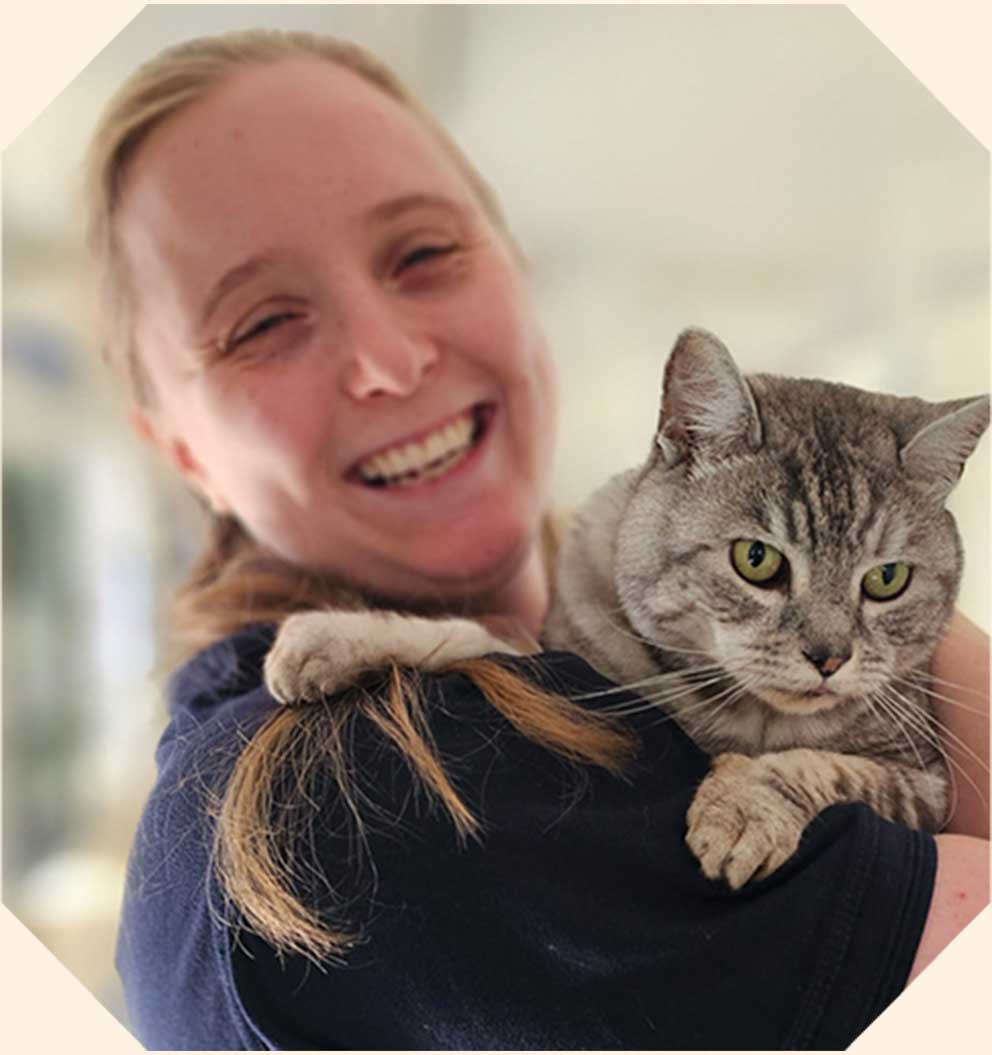Jessica Dowler: An inclusion story
Jessie has worked at Bath Cats and Dogs Home for three years. She was diagnosed with Stargardt Disease (also known as Stargardt macular degeneration), a rare genetic eye condition that causes progressive sight loss, when she was 20.

“I’ve always known that I wanted to work with animals. I loved animals growing up and studied animal behaviour at university. About three years ago my twin sister, who has the same condition as me, was working here at Bath Cats and Dogs Home. When a job came up she encouraged me to apply, saying how supportive everyone was. No one has ever made me feel like I’m asking too much, they have been very supportive. They join me in making light of it, which is important to me because it’s difficult for me to deal with day to day, but it’s going to be my life forever, and I don’t want to be sad about it every day.
“My condition is Stargardt macular degeneration. When I was 20 and learning to drive, I couldn’t quite read the number plates so I went to the optician and they noticed a change in the back of my eye and sent me to hospital. Within two weeks, I went from “nothing’s wrong” to “you’ll be legally blind by the time you’re 40”. It was a lot to process. It’s degenerative, so it gets worse with time. For me it’s a slow progression and I can function and move around fine. Most people with macular degeneration don’t need mobility aids like guide dogs, but it affects reading, and the ability to see faces and things in the distance.
“I’ve been diagnosed for eight years now – nearly a third of my life. It’s part of who I am. A lot of people with disabilities are anxious about revealing it to people. Generally, if I know that I’m going to meet someone more than once, I’ll just tell them. However, handovers with new animal owners are more of a struggle. We only meet briefly, and I don’t want to waste time, so I won’t necessarily tell them. I’ll mask by looking them in the eye. Even though I can’t see their face while I’m doing it, for them it makes things easier.
“At work, I’ve adjusted some of the forms, making them larger print, and I have two monitors on my desk so I can zoom in on everything. The team take assessment notes by hand, so I get them to scan them in so I can zoom in on their writing. And I get people to write in black pen. It’s good that I have the freedom to make adjustments. My managers and our Chief Executive, Rachel, have been great, always asking whether I’m coping ok and if there’s anything they can do for me. When we have training, everyone’s good at reaching out beforehand to ask what I need. That’s useful, and it’s important people don’t feel awkward asking those questions, which is why I’m open about it. I’d much rather someone asks me what I need and the session be good, rather than they think “I don’t want to ask, it’ll be fine”, and then I can’t do what I need to do.
“The other thing that affects my work is travelling here, because I can’t drive so I get taxis. It’s a small cost for retaining that bit of extra independence. I prefer that to relying on people for lifts all the time. Working with animals, in a charity, everyone’s really caring. Animals don’t judge you for anything. I know if I need anything, there are always people there. There’s nothing I’d change at the moment with how well I’m supported. I’m really happy to be in a place where I don’t feel disabled when I’m at work. There are times in my personal life when I do, but at work I don’t.”
Jessica Dowler,
Cat Behaviour Assessor
Bath Cats and Dogs Home, RSPCA Bath and District Branch
Previous Page: Branches
Next Page: Life on the frontline